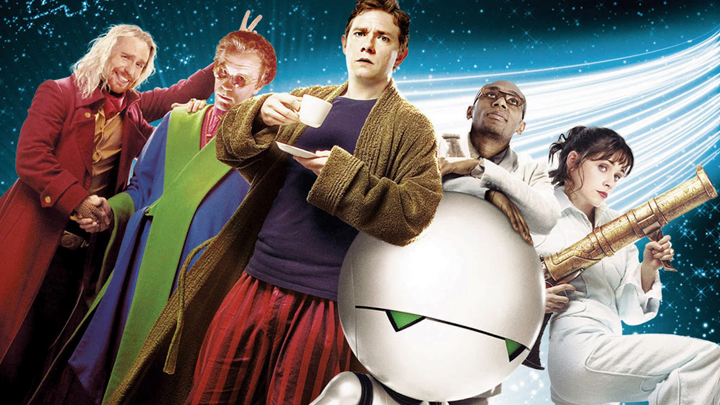What started as a BBC radio series in the 70’s, then a series of books, then a BBC TV show, then a computer text-adventure, and then a towel, was finally made into a big-budget movie in 2005.
I’ve never really subscribed to the idea of the “un-filmable book”. If a book as it stands is un-filmable, then just change the bloody thing until you can film it! This is something that’s always bothered me about Stephen King’s adverse reaction to Kubrick’s treatment of his book, “The Shining”, or Alan Moore to any thing in the world not made by himself and blessed by the serpent god Glycon. Guess what, guys. Books and movies are different beasts! They are consumed by people in fundamentally different ways! Of course, in Moore’s case his objections come from the fact that many of the deeply subversive edges of his plots and characters are inevitably sanded-away by the Hollywood furniture factory looking to make something comfortable for people to sit in. In King’s case, he feels that the closer he can get to actually just having the pages of his books up on the screen for audiences to lean forward and read, then the closer he gets to cinematic perfection.
But it seems to me that Douglas Adams’ wonderful Hitchhiker’s books, at least the first three with their highly absurdist bent, are truly un-filmable. That’s not to say that you can’t make successfully absurd movies. Just look up Monty Python and Mel Brooks in your Funk and Wagnalls. But I think works like Hitchhiker’s, a deft combination of science fiction and British absurdism, is a tight-rope walk that simply cannot withstand the stiff drafts created by the solidity and realism of movie cameras, lighting rigs and real actors.
Having said all that, let’s get on with the show. The plot gets a 2, as it follows the book nicely. The look of the film also gets a 2. It is a meshing of creature work from the Jim Henson Company and CGI effects that generally works pretty well; the Henson creations give the sense of physicality to things like the Vogons, while quick little touches such as Zaphod Beeblebrox’s computer-created third arm help the verisimilitude of the fantastic aspects of Adam’s world. As for casting, it’s hard to be unbiased as an obsessed fan of the original books, but I’ll give the production a 2 here. I think for the majority of the characters, they did pretty good. Commitment to genre? Which genre? But here I’ll give it a 2, based on its commitment to the source material. With a script that allegedly was mostly Douglas Adams’ own work, that’s no surprise.
So a sub-total of 8. Hey, not bad. Better than getting smashed over the head with a lemon slice wrapped around a gold brick. But wait, we’re in for a bumpy ride…
First, we’ll add a point (+1) for the hilarious opening musical number, with the Earth’s most intelligent creatures, the dolphins, giving a song-and-dance farewell to humanity. I’ll give 1 point each for the brilliant casting of Zooey Deschanel (+1) as Trillian and Sam Rockwell (+1) as President of the Galaxy Zaphod Beelblebrox. Rockwell, in particular, gives an uncompromising performance that is right on target. I will, however, deduct 1 point (-1) for Mos Def as Ford Prefect. Not because it is a bit of racial equalizing casting, but because Def doesn’t do much with or for the character. As written Prefect is a gadabout who alternates between trying to sympathize with Arthur Dent and his lost Earth and completely ignoring him while focusing on the larger picture of the entire galaxy. As performed, Mos Def paints him as merely disinterested and distracted. The character of Marvin, the Paranoid Android is a bit of a wash. 1 point (+1) given for the perfectly laconic voice performance by Alan Rickman, 1 immediately withdrawn (-1) for the questionably spherical design of Marvin’s body. We’re not done with Marvin yet, as I’ll add back a point (+1) for the appearance of the Marvin robot from the BBC TV series, queuing up at the Vogon complaints office. I’m going to deduct 3 points (-3) for the movie’s ridiculous and awkward technical solution for the problem of Zaphod’s second head: inserting it with CGI under Rockwell’s chin and having him tilt back his head to reveal it now and then. There’s a fine line between absurd and just plain dumb, and it’s sitting there just below Zaphod’s jawline. I will also deduct 2 points (-2) for the plot-point, original for this movie production, dealing with Humma Kavula. While it takes some easy shots at the idea of organized religion, it also serves no real purpose except to drive the plot in a direction that ultimately goes nowhere.
So, the answer to the ultimate question of life, the universe and everything is 42. The answer to the ultimate question of how many points is the movie version of The Hitchhiker’s Guide to the Galaxy worth? You add it up.
(Editor’s Note: 6 Points)

